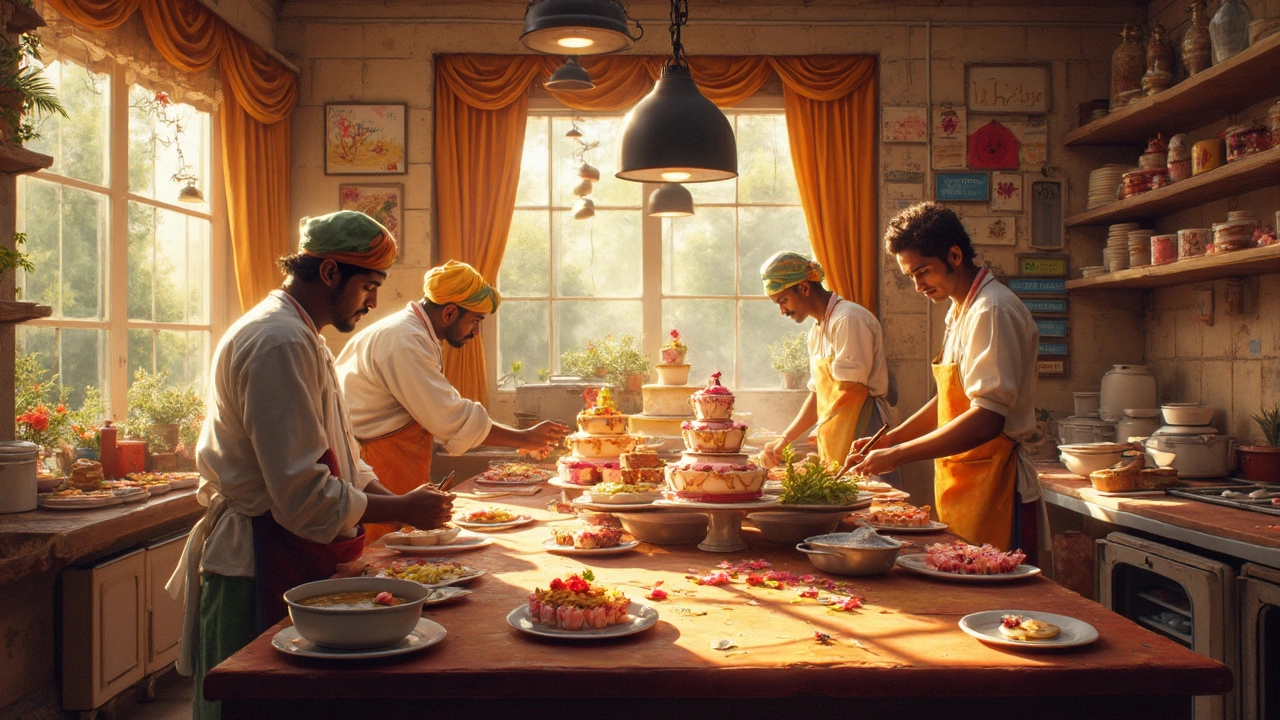
Ever wondered if your wedding cake is baked the morning of your wedding? Spoiler: Probably not. Bakeries usually start prepping wedding cakes about a week in advance—sometimes even earlier if it’s a huge or ultra-fancy cake. So, if you’re stressing about whether your cake will taste fresh, you’re not alone.
Here’s how it works. Most cakes are baked a few days before the wedding, then chilled, decorated, and stored to keep them at their best. This isn’t about cutting corners. Wedding cakes are more than just dessert—they’re all about towering layers, delicate decorations, and structure. That means cakes need time to settle so they don’t slip or sag on your big day.
- The Usual Timeline for Wedding Cakes
- Why Not Make Cakes Fresh the Night Before?
- What Happens Behind the Scenes?
- Tips for Stress-Free Cake Planning
The Usual Timeline for Wedding Cakes
If you’ve ever met with a bakery about your wedding, you’ve probably noticed they want your order at least a few months before your date. That’s not them being picky—they actually need that lead time. For most bakeries, couples lock in their cake design and flavors about 4 to 6 months ahead. This gives the bakery time to order special ingredients, schedule staff, and fit your cake into a packed calendar, especially during peak wedding season.
Once your big day gets close, here’s what usually happens behind the scenes:
- About a week before your wedding, the team starts making any sugar decorations or fondant pieces. These take days to set just right.
- 3-5 days ahead, most cakes are baked. Cakes actually stay moist and even taste better if they rest for a day or two. Bakers wrap them carefully, then chill or freeze them, depending on the recipe.
- 1-2 days before the wedding, the cakes are frosted, stacked, and decorated. This is when the real magic happens—the layers come together, and all the details are added.
- On the morning of the wedding (or sometimes the night before), the cake is boxed up and either delivered to the venue or ready for pickup. No one wants a melted cake in the car for hours, so delivery happens as close to the event time as possible.
Here’s a quick look at a typical schedule:
| Task | When It Happens |
|---|---|
| Finalize order & design | 4-6 months before |
| Prepare sugar/fondant details | 7 days before |
| Bake cake layers | 3-5 days before |
| Assemble & decorate | 1-2 days before |
| Deliver cake | Same day/event day |
Some fancy cake makers even make the outsides (like sugar flowers) weeks or months ahead. But when it comes to the cake you’ll actually eat, it’s chilled—not left sitting around on a counter. This is the standard “wedding cake” process for most bakeries, though some smaller shops may have their own quirks. Either way, you’ll know your wedding cake isn’t being rushed—or left to get stale.
Why Not Make Cakes Fresh the Night Before?
It sounds sweet to imagine a wedding cake whipped up just hours before the celebration. Reality check: for most bakeries, trying to pull that off would be a recipe for disaster. Wedding cakes aren’t just about taste; they’re art projects and engineering feats all at once. Bakers need time to stack those layers, add fillings, and let everything firm up so the cake doesn’t end up in a sloppy heap.
Let’s be real, the night before a wedding is mad busy for any bakery. Most local shops have two to five weddings lined up on a Saturday. Now, imagine making five tall cakes between midnight and sunrise—while also handling all the decorations and packaging. It’s just not manageable if you want everything to look perfect and arrive on time.
There’s also the science behind cake structure. Freshly baked cakes are too soft to support heavy décor or multiple tiers. Many bakers chill their cakes after filling and stacking to make sure they’re stable. This isn’t about sacrificing freshness—it’s about making sure the cake survives transport and still looks flawless on the dessert table.
- Icing and fondant decorations need time to set or dry, especially if sugar flowers or detailed piping are involved.
- Cakes benefit from a resting period so flavors blend and sponges hold their shape.
- Last-minute decorating rarely goes well—one little smash with a spatula and a baker’s entire night could be ruined.
And here’s something people don’t always realize: wedding cakes are usually delivered hours before the ceremony to allow for setup and any finishing touches on site. It’s better to have a cake that’s had time to chill (literally and figuratively) than one that’s rushed straight from the oven to the dance floor. Here’s a look at a typical wedding weekend for a bakery:
| Day | Task |
|---|---|
| Monday-Wednesday | Baking cake layers and prepping fillings |
| Thursday-Friday | Assembling and decorating cakes |
| Saturday | Delivery and final on-site touches |
So while it’s not "made to order" in the literal sense, your cake will still taste fresh and look Instagram-ready—because the timeline is planned for quality, not just speed.

What Happens Behind the Scenes?
So, what really goes on after you place your cake order? There’s a whole system at a bakery that most people never see—and it’s got nothing to do with last-minute magic. As soon as you lock in your design, bakers start planning every step. You’d be surprised at how much is mapped out on big whiteboards and spreadsheets, from flavor batches to flower placement.
Most bakeries use a production schedule, making the wedding cake layers first, then freezing them for a short while to keep them sturdy. This isn’t a cheat—freezing cakes for up to a week keeps them moist and locks in flavor. Once the layers are ready, teams prep buttercream, fondant, or ganache decorations, which are often made days in advance too. Piping delicate flowers or sculpting little details is super time-consuming, so everything that can be done ahead, is.
“We start baking early in the week, and most decorations are made even earlier, especially sugar flowers. Assembly and fine-tuning happen the day before delivery,” says Jenna Rae, co-owner of Jenna Rae Cakes, a popular bakery in Winnipeg.
Here’s roughly how the schedule breaks down for a Saturday wedding:
| Day | Task |
|---|---|
| Monday-Tuesday | Bake cake layers, wrap, freeze briefly |
| Wednesday | Prepare frostings, fillings, start decorations |
| Thursday | Defrost layers, fill and stack cakes, crumb coat |
| Friday | Final coat, add major decorations, box for storage |
| Saturday | Final touch-ups, transport, and on-site setup |
And it’s not only about baking. Food safety checks are constant (the last thing anyone needs is a weird-tasting cake at a wedding). Bakery fridges are packed, but everything is labeled with the couple’s name, flavor, and delivery info—seriously organized! And if your cake has fresh flowers or fruit, those go on at the very last minute so they look their best.
For super detailed cakes, some bakeries will even do a trial run, especially if you’re ordering anything that needs special supports or structures, like a floating tier. This behind-the-scenes work is why ordering a wedding cake isn’t nearly as simple as picking up a birthday cake.
Tips for Stress-Free Cake Planning
If you want your wedding cake experience to go smoothly, timing and clear communication are everything. Bakeries aren't just throwing flour around at the last minute. Here’s what you can do to avoid panic and get the cake you actually want.
- Book your bakery as soon as you have your wedding date and venue locked in. The busiest wedding months—May, June, September, October—fill up fast. Some bakeries need at least six months’ notice, especially for custom or elaborate cakes.
- Schedule a tasting and design consult early. Tastings are usually offered a few months out. This is the chance to nail down flavors, size, and style. Bring photos or a mood board if you have a vision in mind.
- Discuss delivery and setup details. Ask who’ll handle the delivery, when they'll drop off the cake, and if the bakery needs an on-site contact. Knowing who does what cuts down on day-of confusion.
- Double-check the bakery’s policy on allergies, ingredient changes, and last-minute tweaks. If your cousin suddenly can’t have nuts, you’ll know what’s possible—and what’s not—well before the wedding.
- Ask how the cake will be stored before the event. Most bakeries chill cakes to keep them fresh until the big day. If your venue doesn’t have a fridge, ask how they work around that.
Don’t be afraid to over-communicate with your bakery, especially as the date gets closer. Clear expectations and regular check-ins mean way less stress for you and way fewer surprises for your baker.



Comments
Post Comment